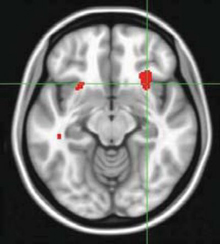Brain Scan May Predict Best Depression Treatment
Brain Scan May Predict Best Depression Treatment
A brain imaging technique may help predict whether people with major depression will respond best to treatment with psychotherapy or a commonly prescribed drug. The approach might eventually be used as a tool to identify treatments that are most likely to succeed.
People with major depressive disorder, or major depression, have feelings of sadness, loss, anger or frustration that interfere with daily life for weeks or longer. Symptoms can also include memory loss and trouble focusing.
In people with major depression, low resting brain activity in the front part of the insula (red area where green lines converge on the right) predicted a higher likelihood of success with psychotherapy and a poor response to escitalopram. Source: Dr. Helen Mayberg, Emory University.
Major depression is most commonly treated with medication, psychotherapy or a combination. Unfortunately, less than 40% of patients typically respond well to initial treatment. They may need to try several treatments over many weeks or months before finally getting symptom relief.
A team led by Callie L. McGrath and Dr. Helen S. Mayberg at Emory University looked for a biological marker or “biomarker” that could predict whether patients with depression would respond best to medication or psychotherapy. The study was funded by NIH’s National Institute of Mental Health (NIMH) and National Institute of General Medical Sciences (NIGMS). Results appeared online on June 12, 2013, in JAMA Psychiatry.
The researchers studied 63 adults, ages 18 to 60, with major depression. Participants underwent a brain scan using positron emission tomography (PET). A small amount of radioactively labeled glucose was used to reveal levels of glucose metabolism—a sign of brain activity—in different areas of the brain. Participants then completed 12 weeks of treatment with cognitive behavior therapy or the drug escitalopram.
Success rates were similar for both treatments: about 36% for psychotherapy and 40% for escitalopram. The rates of those who didn’t respond were also similar: about 27% for psychotherapy and 20% for escitalopram.
Activity in a number of brain regions corresponded to treatment outcomes. The strongest correlation was in an area known as the anterior insula. Increased glucose metabolism in this area corresponded to successful treatment with medication but poor response to behavior therapy. Conversely, decreased glucose metabolism in the area was associated with success using behavior therapy but not escitalopram. One limitation of this potential imaging biomarker, the researchers note, is that it may not predict when neither of these therapies would work.
“Our goal is to develop reliable biomarkers that match an individual patient to the treatment option most likely to be successful, while also avoiding those that will be ineffective,” says Mayberg. “If these findings are confirmed in follow-up replication studies, scans of anterior insula activity could become clinically useful to guide more effective initial treatment decisions, offering a first step towards personalized medicine measures in the treatment of major depression.”
###
* The above story is reprinted from materials provided by National Institutes of Health (NIH)
** The National Institutes of Health (NIH) , a part of the U.S. Department of Health and Human Services, is the nation’s medical research agency—making important discoveries that improve health and save lives. The National Institutes of Health is made up of 27 different components called Institutes and Centers. Each has its own specific research agenda. All but three of these components receive their funding directly from Congress, and administrate their own budgets.




















